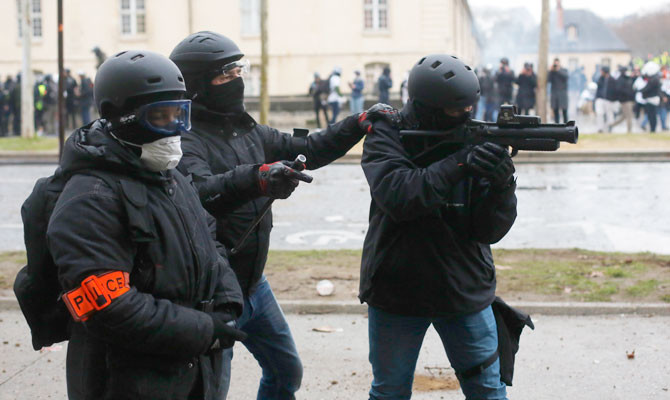PARIS: Clashes broke out throughout France on Saturday, as an estimated 84,000 “yellow vests” demonstrators took to the streets in a 10th consecutive weekend of protests against President Emmanuel Macron’s government.
The demonstrations passed off relatively peacefully in Paris where 7,000 turned up, although Reuters Television reporters saw scuffles briefly break out between police and demonstrators, some wearing masks, in the capital’s Invalides district.
Protesters threw firecrackers, bottles and stones at police who responded with water canon and tear gas to push them back.
“Macron, resign!” some of the protesters shouted.
The “yellow vests” protests — named after the fluorescent jackets French motorists are required to carry in their cars — began in November over plans to raise fuel taxes. The number of demonstrators on Saturday was roughly the same as last week.
The fuel tax hikes were subsequently scrapped, yet the movement has morphed into a broader protest against Macron’s government and general anger over taxes and the cost of living.
“How can we continue to live with so little?” said Bernard Grignan, a 65-year old retired manager who took part in the Paris demonstrations.
TROUBLE IN TOULOUSE
In Paris, some demonstrators carried mock coffins symbolising the 10 people who have died during the protests, mainly due to accidents when demonstrators blocked roads.
December’s demonstrations saw some of the worst violence in decades in Paris, as rioters burned cars and vandalized shops.
Protests in Paris this month have not seen the same level of trouble, although video of a former French boxing champion punching and kicking police in Paris shocked many.
Despite a relative decline in crowd trouble in Paris, however, disturbances have flared up in other cities.
According to official figures, the biggest demonstration on Saturday occurred in the southern city of Toulouse, where around 10,000 people took part. The demonstration turned violent as evening fell, as protesters vandalized a bank and other shops. Eight people were injured and there were 23 arrests.
Reuters correspondents also reported disturbances in Bordeaux, Lyon and Marseille, while the local government building was attacked in Angers, northwest of Paris.
Macron has launched a series of national debates to help quell public discontent and restore his standing.
French far-right leader Marine Le Pen — soundly beaten by Macron in the 2017 presidential election — is looking to take advantage of the “yellow vests” crisis and win ground in the May 2019 European parliament elections.
On Saturday, Le Pen reiterated her support for the protesters at a meeting near Marseille, at which she described the movement as a “legitimate” and “courageous” revolt.
The Angers’ member of parliament Matthieu Orphelin, a member of Macron’s LREM centrist party, said he would cancel talks with members of the “yellow vests” in light of the trouble in Angers.
“It fills me with fury to see our beautiful town attacked in this way, in particular the damage caused to symbols of the Republic,” Orphelin said in a statement.


























